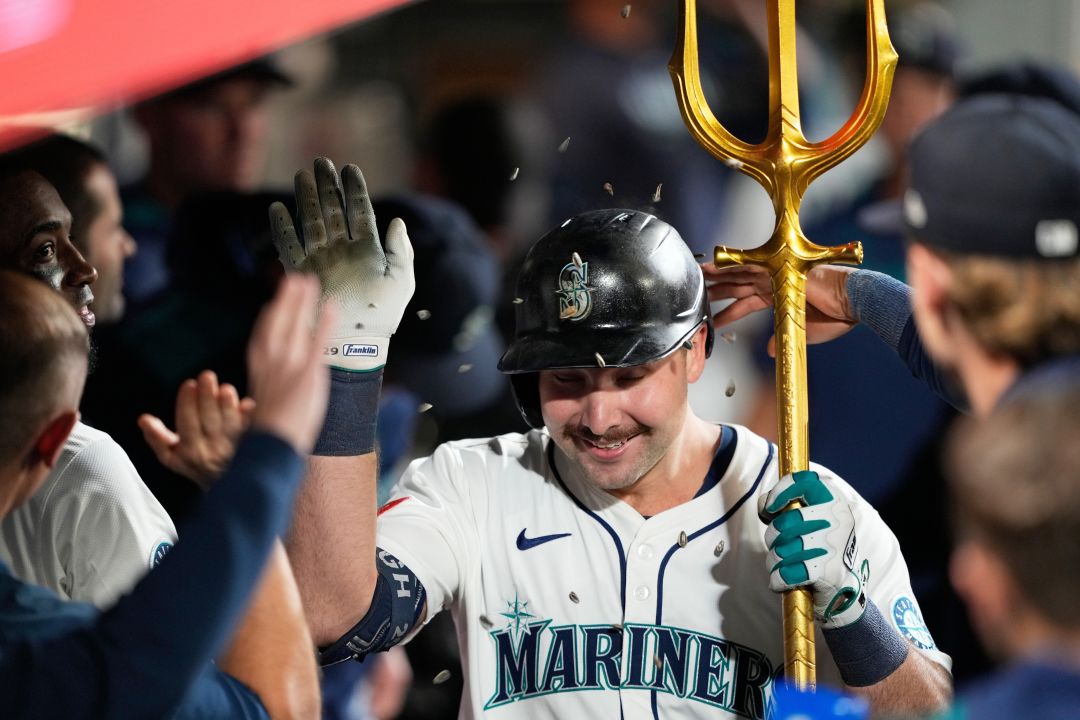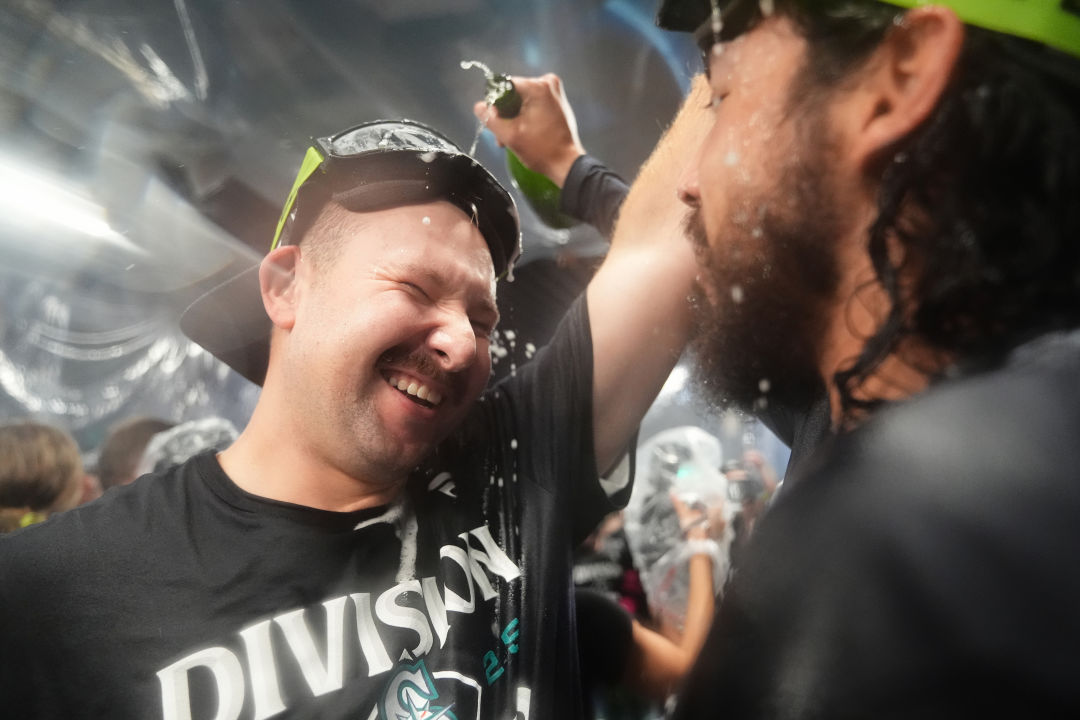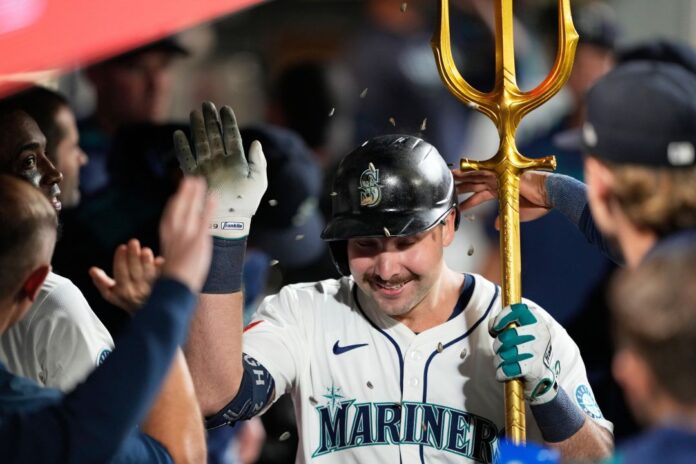This post was originally published on this site

Cal Raleigh started the season as a pretty good catcher. He concluded it as a mustachioed folk hero.
Think back to late March. It wasn’t that long ago. The Seattle Mariners entered the 2025 season with typical Mariners-ish expectations: Maybe they’d compete for a playoff spot, or maybe after yet another underwhelming offseason with no major free agent acquisitions, they’d fall short. They won just three of their first 10 games. Cal Raleigh hit two home runs in that span, both in losses, neither feeling very significant at the time.
There was absolutely no indication that this season would turn out to be one of the greatest in franchise history, right up there alongside the magical run of 1995 and the bewildering dominance of 2001. But no good sports movie starts with the team being good. Not that the Mariners were especially bad. They were just sort of there.
Six months later, we we can say that this might be the best Mariners team ever. And it is definitely the most Mariners Mariners team ever. Of course, we can say it before a single postseason game has been played because of the inescapable subtext of every Mariners season: They have never won a World Series, never even been to a World Series. We can also say it because the Mariners have always been a franchise defined by two things: superstar players and wildly erratic vibes. This year, the superstars have been shining bright, and the vibes have been transcendent.
Let’s start with the superstars. The Mariners entered the season with one. Julio Rodríguez has been exactly as good as anybody could hope for—exciting and charismatic and one of the top dozen or so position players in baseball at just 24 years old. They exit with two.
Raleigh didn’t just have the greatest catcher season in baseball history, he had one of the greatest mythmaking seasons in the history of a sport that is built entirely out of myths. He hit 60 freaking home runs. The most ever by a Mariner. The most ever by a catcher. The most ever by a switch hitter. There he is, among the legends: Ruth, Mantle, Maris, Judge, Griffey, Dumper.
Before Raleigh won the Home Run Derby in July, with his dad pitching and his brother catching, the Mariners had unearthed a home video of his 8-year-old self playing in the backyard and singing, “I’m the Home Run Derby champ.”
Adorable evidence that the past is indeed prologue. A T-shirt was born. The myth of the Big Dumper grew that much more powerful. And it grew more powerful still as the season went on, Raleigh marching toward the historic 60th home run while the Mariners marched toward the American League West title and a bye in the first round of the playoffs.
Was it an easy and pain-free march? It was not. The Mariners spent the first part of the season scraping by—carried by Raleigh, Jorge Polanco, Randy Arozarena, and J. P. Crawford as Rodríguez sputtered and the rest of the lineup was filled in by a random parade of veterans. Remember Donovan Solano? Remember Rowdy Tellez? Remember Leody Taveras? Even the vaunted starting rotation teetered on the brink of mediocrity as Logan Gilbert, George Kirby, and Bryce Miller all dealt with injuries.
But the Mariners hung around. Bryan Woo emerged as an ace. Matt Brash demonstrated why the team missed him so much last year while he recovered from surgery. Then ownership empowered the front office to do something out of character: go out and trade for guys on expensive contracts. First came Josh Naylor. Then Eugenio Suárez.
Naylor has been spectacular for the Mariners: as a hitter, as a shockingly great base stealer, as an ornery personality to balance some of the goofy jubilation that typically marks this team. Suárez, on the other hand, has been fine. But his presence carries symbolic weight that is hard to explain unless you are a Mariners fan. His trade from Seattle to Arizona a couple years ago, the salary dump of all salary dumps, marked the nadir for an ownership group that seemed determined to do anything it could to keep a talented group of players from reaching the playoffs. His return, then, felt like an act of contrition. A rare second chance. And acknowledgment that yes, this is really happening, and it’s happening now.

Cal Raleigh getting dumped on by closer Andres Muñoz. It’s a sight Mariners fans could get used to.
And it did happen. Suárez is a known expert in good vibes (only). He brought them with him. The team has gone 32–20 since the trade, powered by both old-school baseball superstition (a bunch of the guys decided to grow mustaches), and new-school powers beyond the comprehension of ordinary humans (an Etsy witch contracted by a Mariners fan to help them finally beat Houston).
For the past few weeks, they have looked more dominant than at any point in the year. The rotation is one Bryan Woo pectoral strain away from full health. Raleigh is still dumping dingers. Rodríguez is playing his best baseball. They demolished Houston so thoroughly last weekend that, for all the drama, there was very little actual drama as the regular season concluded.
It feels right. It feels like destiny. If you believe in Mariners Numerology, the signs are all there: They won 51 home games in the year they retired Ichiro’s number 51. They won their first division title in 24 seasons on the 24th day of September.
No, March wasn’t that long ago. But it also feels like a lifetime ago. Magical baseball seasons don’t come around too often, and when they do, they don’t reveal themselves right away. After all, this is a sport that rewards patience. It’s a slow build, a wave collecting under the surface of the water before cresting, the little things falling into place before you can make out what they mean and see the big picture.
Fittingly, after the game last Tuesday that clinched a playoff berth (and the night before he hit his 60th home run and the team wrapped up the division title), Raleigh went and quoted an old sports movie—one about a baseball team led by its beloved catcher banding together to overcome a cheap owner with good vibes and even a little bit of supernatural assistance to shock the world. “Might as well go win the whole fuckin’ thing,” he said. Might as well.

















